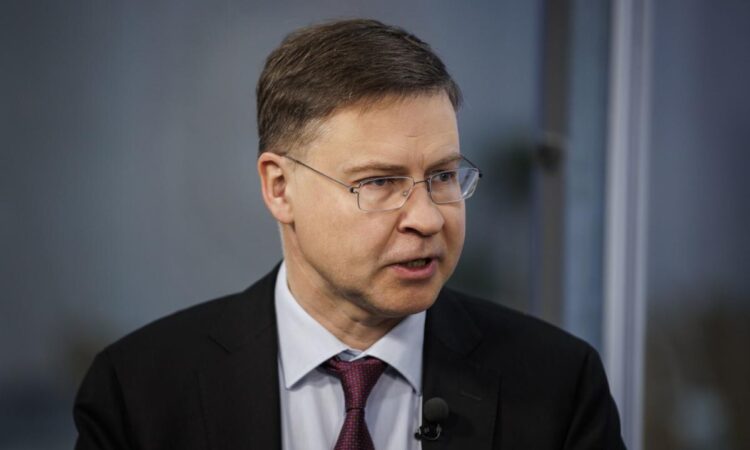
(Bloomberg) — The European Union is determined to scrap the draconian fiscal rules of the past blamed for choking economies in the aftermath of the previous financial crisis despite Germany’s call for strict limits to reduce public expenditure.
Most Read from Bloomberg
“Clearly we are not getting back to the 1/20th rule” that forced member states to implement severe adjustments to their public debt levels, European Commission Valdis Dombrovskis said in an interview Friday the sidelines of the spring meetings of the International Monetary Fund in Washington.
Still, the European Commission, the EU’s executive arm, is assessing and putting “the final touches” on common quantitative benchmarks to ensure the equal treatment of member states under the new system, Dombrovskis added.
The commission will propose in the coming weeks — most likely by the end of this month — legislative proposals for the long-awaited reform of the Stability and Growth Pact, the bloc’s rules to control public expenditure.
The amendments will give more leeway to national governments to determine their fiscal path and space for growth oriented-investments, Dombrovskis confirmed. But it will also contain a common methodology to ensure equal treatment among the capitals with clarity about the fiscal path recommended by the commission for each country.
Germany had expressed concerns about the possibility of the Commission giving too much leeway to some governments to balance their public accounts in opaque bilateral deals and pushed for more transparency.
In addition, the German finance ministry led by Christian Lindner wanted member states to cut down by 1% per year public debt in the most worrying cases and half point when the excess of indebtedness is more moderated.
The EU Commission criticized some of Germany’s proposals, according to a German government official. The so-called common safeguard — a requirement that highly indebted countries must reduce their debt levels by a certain amount each year, but which doesn’t take the nation’s the economic situation into account — was among the criticisms. Berlin, however, is of the view that this target isn’t set too high.
Some of the German proposals were criticized by the EU Commission, according to a German government official — especially the “common safeguard,” the requirement that highly indebted countries must reduce their debt levels by a certain amount each year. That wouldn‘t take into account the economic situation. However, Germany doesn’t feel that this target is set too high.
The Netherlands, one of the countries traditionally aligned with Berlin in regards to budgetary control, is however in favor of national debt-reduction paths and giving more space for investment, in particular in areas such as the green transition.
“At the same time, we also know that it is important to have safeguards that could include common numerical benchmarks and, of course, effective oversight,” Dutch Finance Minister Sigrid Kaag said in an interview in Washington. She added that the sanctions contemplated in the current system have not really been applied.
”You need a carrot and a stick, and I think that’s also where the balance lies,” she said.
EU finance ministers agreed last month that one of the issues that required further clarification was “the appropriateness and design of common quantitative benchmarks to support the reformed framework”.
But for some capitals, it would be a step back returning to common indicators that would not reflect the different national economic situation and would limit the EU governments’ space to design their fiscal paths, a senior EU diplomat said.
The discussions among the European capitals to review their public expenditure oversight came as the IMF called on the region’s governments to pursue more ambitious fiscal consolidation.
The fund’s director of the European department, Alfred Kammer, told reporters on Friday that “more consolidation now will be better” to help combating inflation, which would allow the European Central Bank to be less aggressive with interest rate hikes and could help to contain the turbulence in the financial sector.
The IMF supported the commission’s ideas to have a risk-based and differentiated approach when it comes to the EU fiscal rules because the economic situation of countries differs.
Kammer however emphasized that the discussions on the fiscal rules should be brought to an end soon. The commission first launched the process in early 2020 — before the pandemic started — and member states agreed last month to conclude all the legislative work by the end of this year.
Member states are urging the commission to come forward with the legislative proposal as soon as possible.
“Otherwise, you start a parallel and shadow conversations, which will be to the detriment actually of the quality of the proposal,” Kaag said.
–With assistance from Viktoria Dendrinou and Kamil Kowalcze.
(Updates with common-safeguard positions in eighth paragraph.)
Most Read from Bloomberg Businessweek
©2023 Bloomberg L.P.






